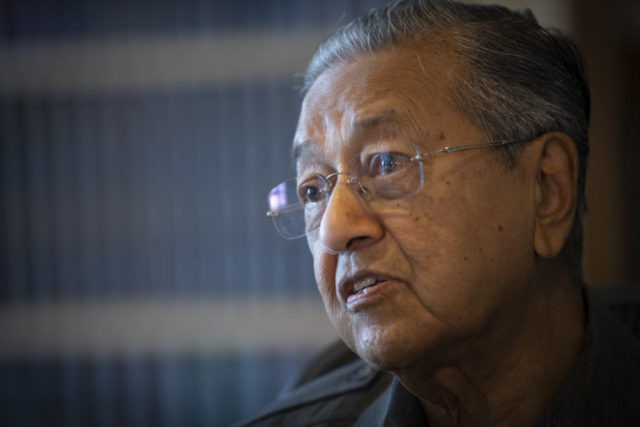PUTRAJAYA, Malaysia (AP) — Former Malaysian strongman Mahathir Mohamad said Wednesday that huge rallies indicate some of the ruling coalition’s traditional Malay supporters are now favoring the opposition and a change of government is possible in next month’s elections.
Mahathir, Asia’s longest serving political leader until retiring after 22 years in 2003, is now leading a four-party opposition alliance to oust scandal-tainted Prime Minister Najib Razak in May 9 polls. Najib’s ruling coalition has increasingly depended on the Malay Muslim majority in poor rural areas to retain power after urban middle-class voters flocked to the opposition in the past two elections.
In an interview with The Associated Press, the 92-year-old Mahathir said Malay support for the opposition has undergone an obvious increase, citing unusually huge turnout at rallies.
Mahathir said the opposition wouldn’t need every government supporter to change their mind. “We need maybe 30 percent of them to turn around, that would be sufficient for us to win,” he said in the interview.
Yet, Mahathir predicted only a 50-50 chance of victory for the opposition “because of the government tendency to cheat, to threaten people, to use money, to even block the election process.”
Najib, 64, has been dogged by a massive corruption scandal involving the 1MDB state investment fund, which he set up and previously led. The fund accumulated massive debt and the U.S. and other countries are investigating possible cross-border embezzlement and money laundering. Najib himself has denied wrongdoing and has fired critics and muzzled reporting on the scandal.
Mahathir said even though rural Malays underestimate the scale of the 1MDB scandal, they have been hard hit by rising cost of living due to the introduction of a 6 percent goods and services tax in 2015 to raise government revenue.
“Now wherever we go, we have a huge number of people coming to us and most of them are Malays. They will come out and they will listen to the talks until the very end. They don’t move, they don’t go away. It shows their interest,” Mahathir said of the crowds at opposition rallies.
“I think there is a wave — whether you call it, a tsunami or not, I don’t know — but there certainly is a change of heart among the rural Malays,” Mahathir said.
Najib’s National Front coalition lost its two-thirds parliamentary majority in 2008 polls. In 2013, it secured its lowest number of parliamentary seats ever and lost the popular vote for the first time to the opposition, which Najib blamed on a “Chinese tsunami.” It currently holds 132 out of 222 parliamentary seats.
More than half of the 222 parliamentary seats at stake in next month’s election are dominated by Malays, who have traditionally been strong government supporters. Malays and other indigenous groups are about two-thirds of Malaysia’s people, with Chinese about a quarter and ethnic Indians and others the rest.
New electoral maps approved earlier this year were seen as benefiting Najib’s coalition, and the election date itself was controversial; the midweek vote was seen as depressing turnout among Malaysia’s 14.94 million eligible voters and so was hastily declared a public holiday.
“If it is a fair election, the opposition would win hands down. Such is the dislike for the present government that most people would vote for the opposition but of course, the government has the power and the authority to abuse the system completely,” Mahathir said, citing the new maps and the suspension of his nascent political party just before election was called.
In the event of an opposition victory, Mahathir warned that there could be instability if their win is small.
“With Najib, we can never be very sure that he wouldn’t resort to illegal means to retain his position. So if the majority we obtain is small, he might create a problem,” he said. He noted Najib could declare an emergency in the event of violent political demonstrations.
“The opposition can protest, I suppose. They can take to the streets, but it will mean violence. It will mean a repeat of 1969 on a bigger scale perhaps. That is possible,” he said, referring to bloody racial riots in 1969 that killed more than 200 people.
Mahathir said the 1MDB scandal, which is being investigated by the U.S and several other countries for cross-border embezzlement and money laundering, has blackened Malaysia’s international reputation.
The opposition will reopen investigations into the 1MDB if it wins the election, he said, but denied it will be targeted at Najib.
“If it reaches the court, the court will decide, we are not going to decide. It is not a question of revenge, we are not going to take revenge on him but the law must be respected,” Mahathir said.
The U.S. Justice Department says at least $4.5 billion was stolen from 1MDB by associates of Najib and it is working to seize $1.7 billion allegedly taken from the fund to buy assets in the U.S.
Mahathir said he regretted not putting in place stronger checks on power when he was premier.
“I did not know it at the time of course but I regret very much that I was not able to foresee the kind of damage that can be done by a prime minister under the existing law.”
If Najib retains power, Mahathir said the country will be bankrupted due to ballooning national debts that the government cannot pay.
“This country will be totally destroyed,” he said.

COMMENTS
Please let us know if you're having issues with commenting.